HowTo: Using threads on the web in an egui app
Currently, I’m porting a desktop app to the web. The app gui is written in egui, and compute-heavy tasks use threads both for improved user experience and for increased performance.
But: On the web threads cannot be used - because the API just does not exist. A partial replacement is called webworkers.
In this short blog post, I adjust the eframe-template app to use webworkers. You can find the example here.
I learned this from minno728. Thank you!
The issue
First we clone the eframe-template app:
git clone https://github.com/emilk/eframe_template/We adjust app.rs to start a thread. From
fn update(&mut self, ctx: &egui::Context, _frame: &mut eframe::Frame) {
// Here we insert our snippet
egui::TopBottomPanel::top("top_panel").show(ctx, |ui| { to
fn update(&mut self, ctx: &egui::Context, _frame: &mut eframe::Frame) {
log::debug!("before thread");
let _ = std::thread::spawn(|| log::debug!("message from thread"));
log::debug!("after thread");
egui::TopBottomPanel::top("top_panel").show(ctx, |ui| { This does not work. Here is the error message on Firefox and Chrome.
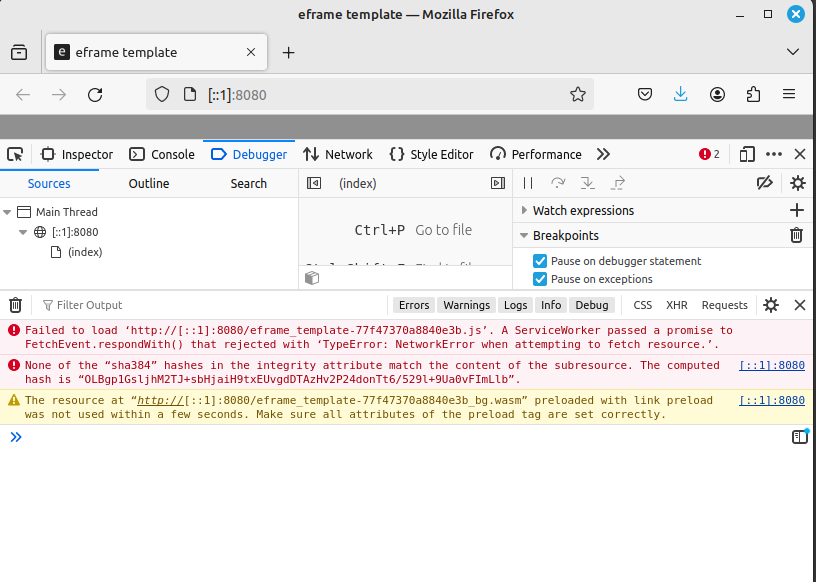
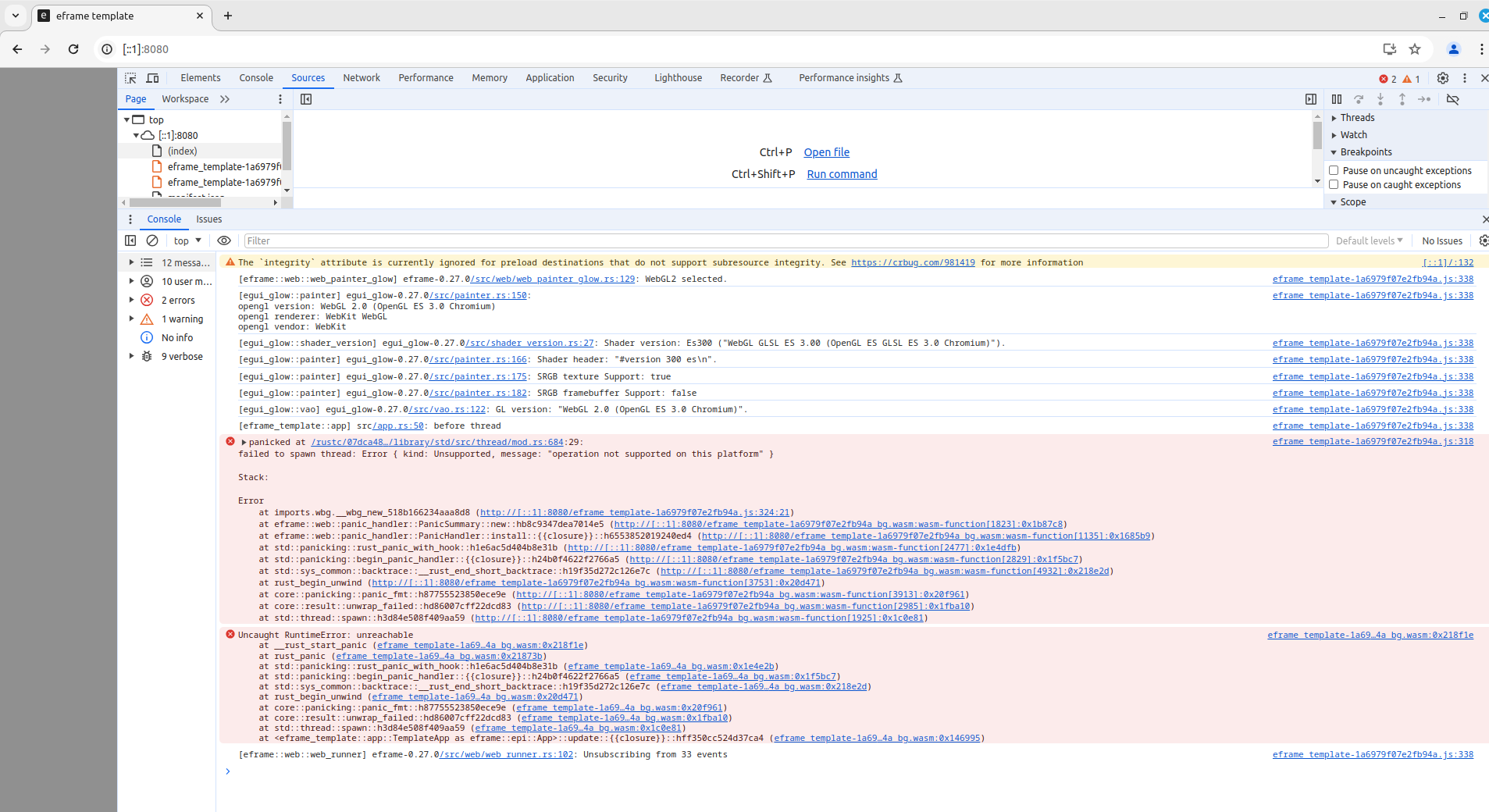
Note that the Chrome error is much more helpful. Also note, that log statement after the thread.spawn(…) is not reached.
Solution
The solution is to replace the thread on Wasm with a webworker. For this we will use the crate gloo_worker:
cargo add gloo-workerWe will need to adjust the index.html file as well as some rust code.
The Gloo worker
We add a new rust file, webworker.rs.
pub struct WebWorker {} Then we implement gloo_worker::Worker, using rust-analyzer:
impl gloo_worker::Worker for WebWorker {
type Message;
type Input;
type Output;
fn create(scope: &gloo_worker::WorkerScope<Self>) -> Self {
todo!()
}
fn update(&mut self, scope: &gloo_worker::WorkerScope<Self>, msg: Self::Message) {
todo!()
}
fn received(&mut self, scope: &gloo_worker::WorkerScope<Self>, msg: Self::Input, id: gloo_worker::HandlerId) {
todo!()
}
}which we fill in with typed dummy data
#[derive(Debug)]
pub struct Message(pub u32);
#[derive(Debug, serde::Serialize, serde::Deserialize)]
pub struct Input(pub u32);
#[derive(Debug, serde::Serialize, serde::Deserialize)]
pub struct Output(pub u32);
pub struct WebWorker {}
impl gloo_worker::Worker for WebWorker {
type Message = Message;
type Input = Input;
type Output = Output;
fn create(_scope: &gloo_worker::WorkerScope<Self>) -> Self {
log::debug!("create");
Self {}
}
fn update(&mut self, _scope: &gloo_worker::WorkerScope<Self>, msg: Self::Message) {
log::debug!("update {msg:?}");
}
fn received(
&mut self,
scope: &gloo_worker::WorkerScope<Self>,
msg: Self::Input,
_id: gloo_worker::HandlerId,
) {
log::debug!("received {msg:?}");
scope.respond(_id, Output(msg.0 + 5001));
}
}Adjusting fn new(…)
Next we proceed with app.rs. We start our webworker together with our app, so we adjust fn new(cc : ..). If our webworker sends a response, we collect the latest and ask egui to repaint. Do you see this funny javascript file? We come back to it later. 1
pub fn new(cc: &eframe::CreationContext<'_>) -> Self {
let ctx = cc.egui_ctx.clone();
let data_update = std::rc::Rc::new(std::cell::Cell::new(None));
let sender = data_update.clone();
let bridge = <crate::webworker::WebWorker as gloo_worker::Spawnable>::spawner()
.callback(move |response| {
sender.set(Some(response.0));
ctx.request_repaint();
})
.spawn("./dummy_worker.js");
// …We adjust the TemplateApp accordingly, from
#[derive(serde::Deserialize, serde::Serialize)]
#[serde(default)]
pub struct TemplateApp {
// Example stuff:
label: String,
#[serde(skip)] // This how you opt-out of serialization of a field
value: f32,
}to
#[derive(serde::Deserialize, serde::Serialize)]
#[serde(default)]
pub struct TemplateApp {
// Example stuff:
label: String,
#[serde(skip)]
value: f32,
#[serde(skip)]
bridge: Option<gloo_worker::WorkerBridge<crate::webworker::WebWorker>>,
#[serde(skip)]
data_update: Option<std::rc::Rc<std::cell::Cell<Option<u32>>>>,
}and stores the added data in the new function.
Finally, we work with the update method: We check if there was a request, by adding the following code snippet:
let data_update = self.data_update.as_mut().unwrap();
if let Some(update) = data_update.take() {
log::debug!("Received update: {update:?}")
}Then, in the button of the egui template, we trigger our webworker Thus, we exchange
if ui.button("Increment").clicked() {
self.value += 1.0;
}with
if ui.button("Increment").clicked() {
self.value += 1.0;
let msg = self.value.floor().max(0.) as u32;
self.bridge
.as_mut()
.unwrap()
.send(crate::webworker::Input(msg));
log::debug!("Message send {msg}");
}Now, we finally can try it (and fail …)
trunk serveRemark: If you reload the egui web app, you might need to unregister the service worker, check about:serviceworkers (Firefox).
The error messages, Chrome and Firefox:
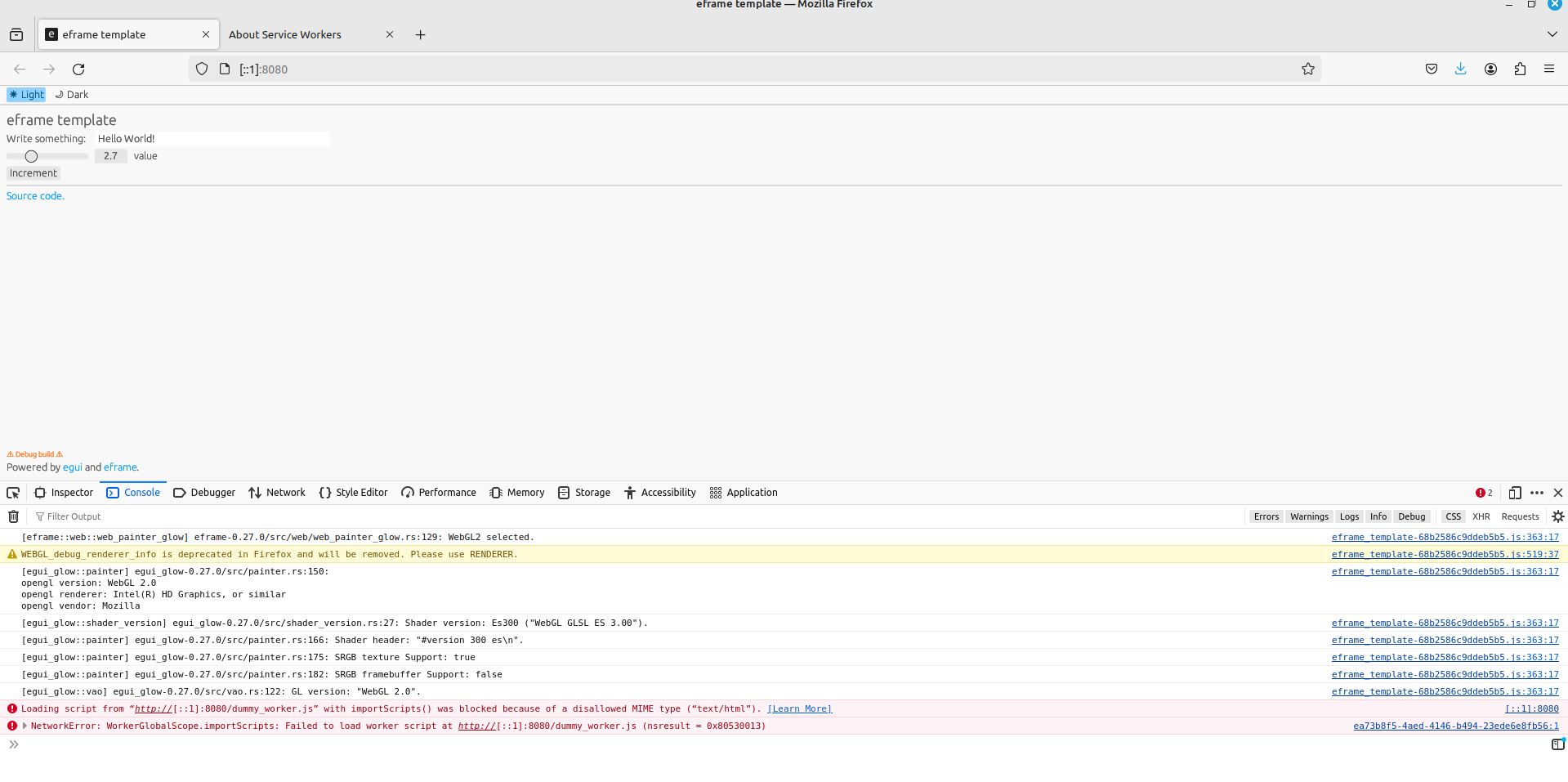
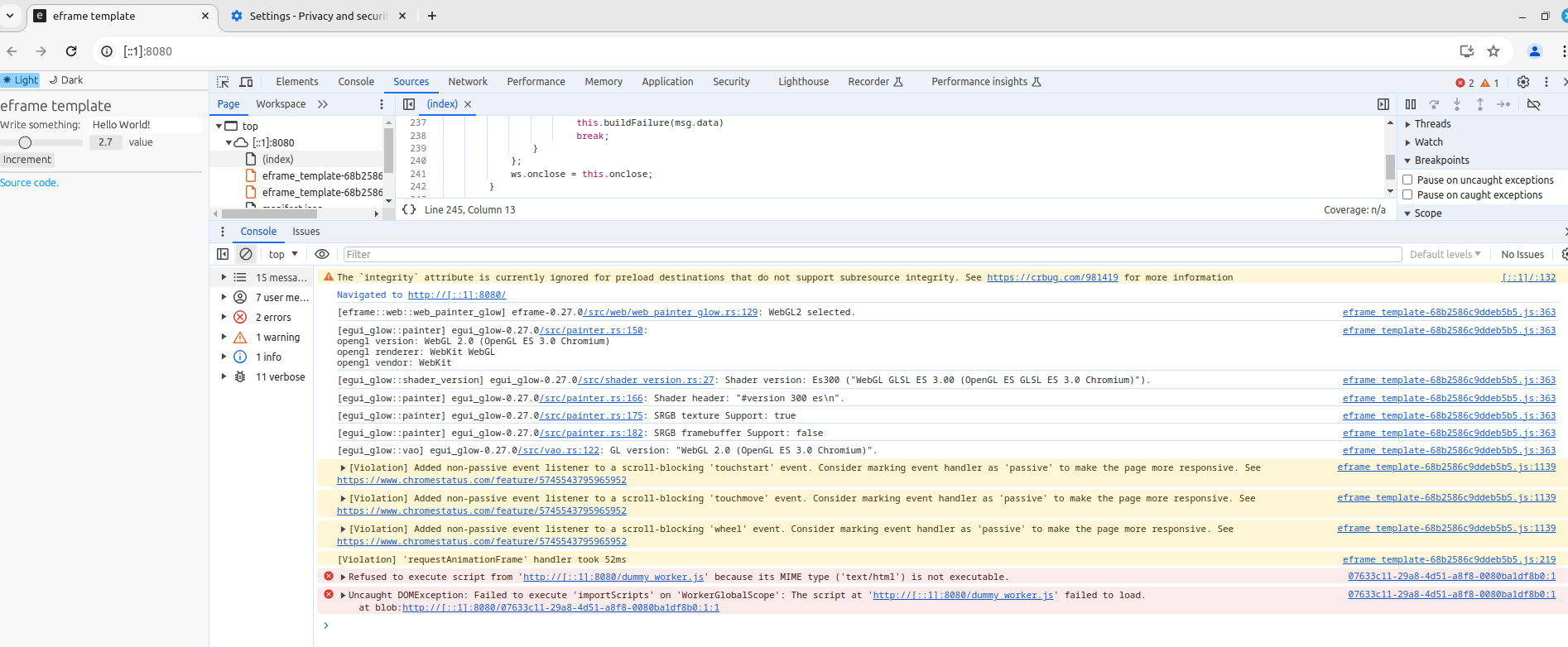
Both errors point to the javascript file, dummy_worker.js, which we used in the spawn function.
Remark: Note that our app does no longer run on the desktop :-/
cargo run
Finished dev [unoptimized + debuginfo] target(s) in 0.31s
Running `target/debug/eframe_template`
thread 'main' panicked at ~/.cargo/registry/src/index.crates.io-6f17d22bba15001f/js-sys-0.3.66/src/lib.rs:5982:9:
cannot call wasm-bindgen imported functions on non-wasm targets
note: run with `RUST_BACKTRACE=1` environment variable to display a backtrace
Adding a second binary
The missing javascript file will automatically be generated by trunk serve. To this end we add a second binary to our crate2.
[[bin]]
name = "dummy_worker"
path = "src/dummy_worker.rs"We create a new file, dummy_worker.rs:
use gloo_worker::Registrable;
fn main() {
eframe_template::webworker::WebWorker::registrar().register();
}Finally, we need to adjust index.html, to communicate this change to trunk: we replace
<link data-trunk rel="rust" data-wasm-opt="2" />with
<link data-trunk rel="rust" data-wasm-opt="2" data-bin="eframe_template" data-type="main" />
<link data-trunk rel="rust" href="Cargo.toml" data-wasm-opt="2" data-bin="dummy_worker" data-type="worker" />Now it works :-)
trunk serveClicking on increment, sends messages:
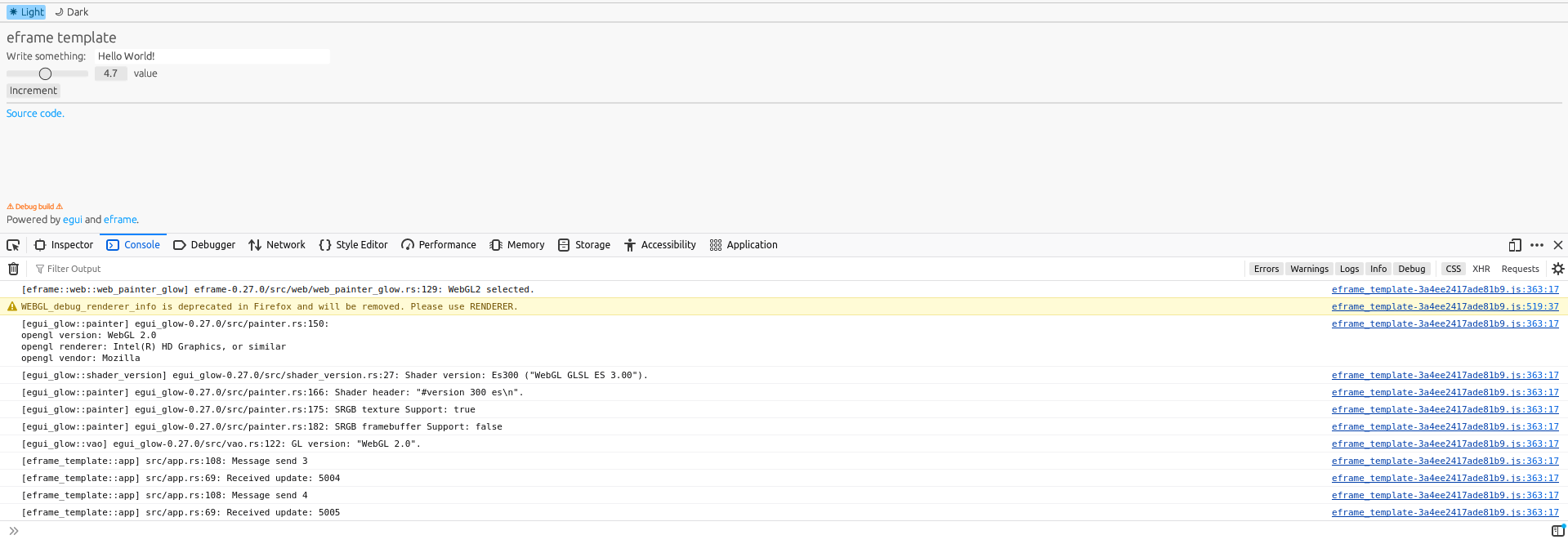
Further questions
- The logging statement from the WebWorker is not working. I’m unsure why.
- The trait gloo_worker::Worker has an associated type “Message”. What does it do?
- Can we start multiple web workers? A dynamic number? I plan to test this next.
- When is the create function of the gloo_worker actually called? I’ve cheked that it is not called during the spawn function of our bridge. I tried to debug it, setting a break point inside the create function of the WebWorker struct. But clicking on the button in the GUI still works, even if paused in this breakpoint …